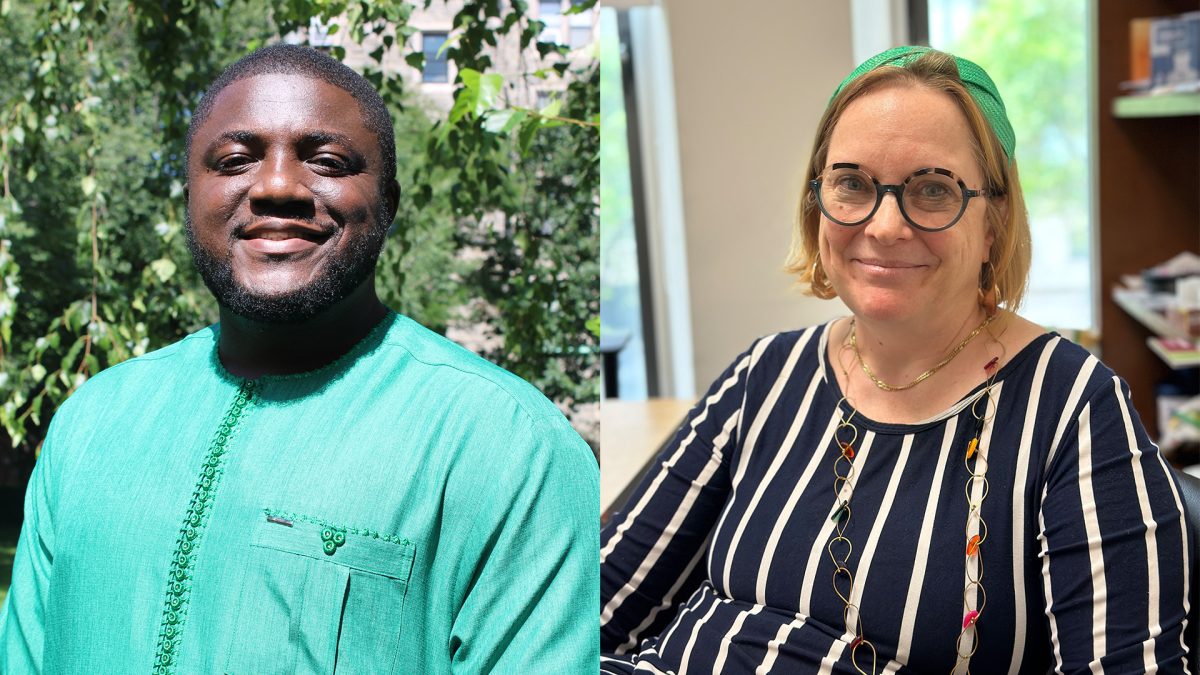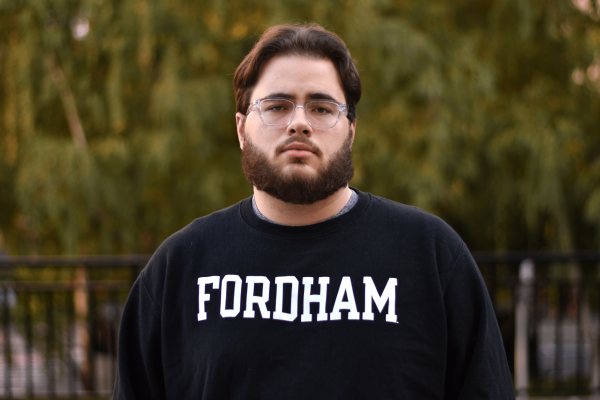On the Outdoor Plaza last Thursday, Sept. 7, Imam Ammar Rahman and Rabbi Katja Vehlow addressed students and faculty at Fordham’s annual Interfaith Prayer and Picnic.
“As you stand at the threshold of a new chapter of your lives,” Rahman said. “We gather here today seeking the guidance and blessings of God.”
Rahman, standing tall in a blue robe, read from the Quran and spoke of his hopes for the Fordham community. After a few minutes, he stepped aside as Vehlow took over the microphone.
Vehlow asked if anyone wanted to blow the shofar horn she had brought along, as, with asthma, it’s difficult for her to sound. She then launched into some prepared words.
“You don’t have to be intellectual — anyone can do this,” Vehlow said. “You can pray with your heart. You can bring soup to a sick neighbor. You can support the poor. You can live a good life.”
This was the first time the event featured the directors of Muslim and Jewish life.
“We now have more Jewish and Muslim students than ever before. We’re a very diverse community. We need to serve that community.” Father Philip Judge, Executive Director of Campus Ministry
In May, the university announced the hirings of Vehlow and Rahman — they’re the first non-Catholic chaplains that Fordham has ever hired.
“We’ve certainly seen a need for these positions for years,” the director of Campus Ministry at Lincoln Center, Erin Hoffman said. “While we would have loved to have had them in place years ago, we’re glad that they’re here now.”
Father Philip Judge, a member of the Society of Jesus and executive director of Campus Ministry, said the Fordham community’s growing religious diversity contributed to the need for these positions.
“We now have more Jewish and Muslim students than ever before,” Judge said. “We’re a very diverse community. We need to serve that community.”
Hoffman said that they each have a deep understanding of other traditions — and are eager to learn.
“They work really well together, with each other and with other colleagues in our area,” Hoffman said.
Vehlow, originally from Germany, came to the United States to pursue her doctorate of philosophy at New York University. After receiving her doctorate, she taught religious studies at the University of South Carolina for a decade. She returned to New York to study to become a rabbi, becoming one in 2022. While doing freelance work as a rabbi, she served as a chaplain at the Maimonides Medical Center in Brooklyn.
“Working as a hospital chaplain taught me about being present with people,” Vehlow said. “It taught me to just be with people.”
Although working with patients and their family members is different from her current work, Vehlow learned a lot about the importance of presence. Now, she wants to apply those skills to her work with students and faculty at Fordham.
“Just being there for others, I think, is very transferable,” she said.
Both Rahman and Vehlow said they want to see interfaith dialogue on campus flourish.
Rahman found himself involved in ministry at an early age. As an undergraduate student, he served as “the unofficial imam” for Lehman College’s Muslim Students Association. In this role he helped run programs that were open to all students regardless of faith which garnered high attendance from the student population. Rahman has also served as the deputy Imam and director of Community Engagement and Youth Activities at the Al-Haram Masjid USA INC. mosque in The Bronx since 2018.
In addition to his pastoral responsibilities, he works as the outreach coordinator at the Interfaith Center of New York. Rahman also works with the New York Disaster Interfaith Services, which he called “the largest interfaith organization in the city,” to collaborate with houses of worship in finding shelter for asylum seekers in the city.
His agenda for the beginning of the fall semester include weekly halaqas — gatherings to talk about each other’s lives and the Quran — on Mondays at Rose Hill and Thursdays at Lincoln Center, and jumma prayers on Fridays. Both will be available for all students to attend.
Both Rahman and Vehlow said they want to see interfaith dialogue on campus flourish.
One event they’re excited about is a series of readings of the story of Abraham from the Bible, the Torah and the Quran.
Mutual respect and cordiality when engaging in interfaith dialogue are incredibly important, Vehlow said, especially when disagreements in belief arise.
“The goal is for students to see the little differences in all the stories — but also see the similarities in the stories,” Rahman said.
“We are more alike than we are different,” he emphasized. “Instead, we could look at it as disagreement and treat it as is, and then also look at the things we agree and celebrate them.”
Vehlow said that the purpose of this event is to not only build community but for students to gain a better understanding of their personal beliefs.
“We both feel very strongly that it’s important to have familiarity with each others’ traditions,” she said. “It enriches our own identities and who we are and it’s just good to know each other.”
Mutual respect and cordiality when engaging in interfaith dialogue are incredibly important, Vehlow said, especially when disagreements in belief arise.
For Vehlow, breaking bread together is for everyone.
“I’m sure that we will disagree on all kinds of things, and that’s totally okay,” she said. “We can still sit down and break bread because there’s a big difference between having a conversation and having a debate — or having a conversation and having a big fight.”
Rahman said we should not let our differences in beliefs affect how we interact with each other.
“When we disagree, we cannot make that the whole of our relationship,” he said.
For Vehlow, breaking bread together is for everyone.
“Everybody’s open to come to a Shabbat dinner or to come to talk at all times. We can all go to a Muslim prayer to see what others are doing. It sort of demystifies a little bit. It creates familiarity,” she said.
Interfaith dialogue is already taking shape at Fordham, and they said they’ve already seen it.
“So far, I’ve had two students come to me, and we’ve had a conversation about what it means to be having an interfaith dialogue,” Rahman said. “Traditionally, they don’t do it. It’s not something that Muslims will do. But we had a whole hour of conversation about why this is rooted in Islam, and it’s permissible in Islam, but also is necessary.”
Vehlow, too, has watched as interfaith friendships have blossomed. “This is one of the things I really love seeing here at Fordham,” she said.
The picnic celebrated the interfaith connections that Rahman and Vehlow hoped to foster.



Stephen G Adubato • Oct 4, 2024 at 10:30 am
Fordham has had non-Catholic chaplains. I think you mean non-Christian.